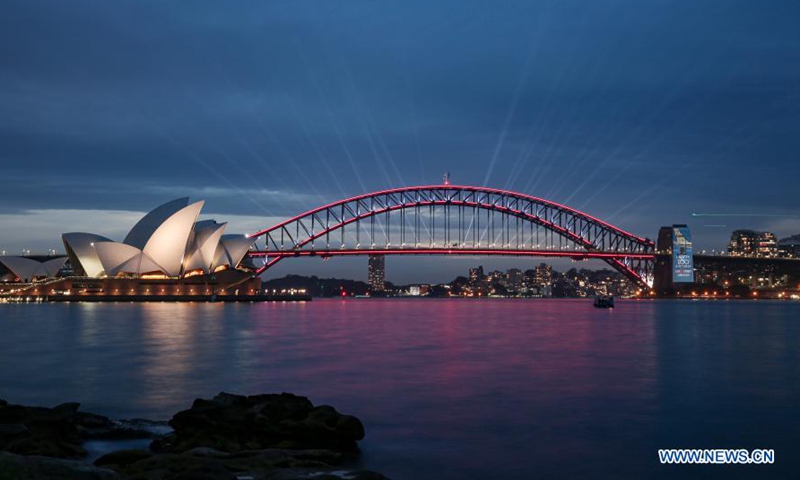Australia turns softer on China, not wanting to lose economic interests after RCEP
By Wang Qi and Yin Yeping Source: Global Times Published: 2020/11/24 22:38:40
Economic pressure, White House transition are keys to change of attitude

Sydney, Australia Photo: Xinhua
Australian Prime Minister Scott Morrison, US President Donald Trump's "man of titanium" when it comes to anti-China moves, offered an olive branch to China amid the White House power transition, which pundits regard as opportunistic behavior under domestic economic pressure and adjustment of the nation's China policy.
Morrison, who recently made a speech to the UK think tank Policy Exchange, said that Australia should not have to pick a side between its alliance with the US and "mutually beneficial relationship" with China, explaining that Australia's actions were wrongly interpreted by Beijing as they were not part of the US strategy to contain China.
Morrison even acknowledged China's achievements in economic growth and poverty alleviation, after all 832 national-level poor counties were lifted out of poverty as of Monday, which was an "olive branch" unlike from his previous hardline stance, observers said.
Chinese Foreign Ministry spokesperson Zhao Lijian on Tuesday said that Australia should make objective, rational and independent decisions on its relationship with China, discarding ideological bias.
Zhao warned Australia on November 18 that it has repeatedly used wrong words and deeds on issues involving China's core interests and major concerns, which constitute the root cause of the relationship falling to its lowest ebb.
Morrison signed an Australia-Japan defense pact during his Tokyo visit last week, seeking to contain China in the area and catering to US' Indo-Pacific strategy.
Morison has been praised by Trump as a "man of titanium," The Sydney Morning Heard reported.
Zhou Fangyin, a professor at the Guangdong Research Institute for International Strategies, told the Global Times that Morrison's change was partly due to the White House power transition.
Australia has been at the forefront of the strategic competition between China and the US in the past few years, but as Biden is unlikely to be as extreme as Trump, Morrison hopes to give himself more options.
Some 40 percent of Australia's exports go to China, and with the signing of the Regional Comprehensive Economic Partnership (RCEP), the two countries will have more shared economic and trade opportunities, Ning Tuanhui, a research assistant with the China Institute of International Studies, told the Global Times.
Chen Hong, professor and director of the Australian Studies Center of East China Normal University, told the Global Times that following an anti-China strategy runs counter to Australia's national interests.
"Chinese companies and investors are losing confidence in Australia's business environment, and Chinese consumers are becoming less and less comfortable with the exports on which Australia's economy is now heavily dependent," said Chen.
Trade statistics for the past several months show that China-Australia trade has experienced setbacks. According to Chinese customs data released on October 13, China's imports from Australia reached 69.16 billion yuan ($10.3 billion) in September, down 10.47 percent year-on-year. Politicians and media organizations in Australia have appealed for an easing of tension with China, Australia's biggest trading partner, as "China's economic might, hungry for our resources, underwrote Australia's 30 years of uninterrupted economic growth," said the ABC.
The signing of the RCEP and being open to the CPTPP have shown China seeks mutual respect and mutual benefit with an open mind. New Zealand and many other South Pacific countries are quite active in economic cooperation with China, the only economy that keeps growing despite the pandemic, and Australia does not want a political row to keep jeopardizing its economic prospects, analysts said.
"But we cannot expect too much from Morrison's remarks. The key is what he does next," said Ning, noting that the country must not attack China in regard to Hong Kong and Xinjiang affairs while seeking economic benefits from trade with China.
Newspaper headline: Australia 'turns softer on China'
Posted in: DIPLOMACY